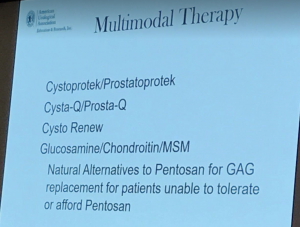Drug and Patient Assistance Programs

Jill Osborne MA – ICN Founder
It’s a sad fact that many medications are so overpriced that the majority of patients simply cannot afford them. The only FDA approved oral medication for IC (Elmiron) has risen in price dramatically with some patients reporting that they are paying more than $3000 per prescription. Fortunately, more affordable alternatives are available, particularly the OTC supplements (under $50 per month) now suggested by the American Urological Association in Step One of their IC Treatment Guidelines. There are also variety of drug assistance programs that may help you find drugs at a far lower cost though you may have to jump some hoops to get there! – Jill O.
Strategies For Saving Money On Medications
Prescription drugs can be a costly medical expense, especially for senior citizens, those with chronic illnesses and/or limited incomes. A simple prescription for Elmiron, for example, can cost more than $3000 a month if it’s not covered by health or drug insurance. Here are some quick, easy tips that can help you reduce some of your drug costs. If you have any additional suggestions, please let us know!! We’re always looking for more tips that can help other patients.
- Talk with your doctor – Ask for medications which are lower in cost, including generic medications when available. If you discover that a new prescription is beyond your budget, call your doctor immediately and ask if any different, less expensive medications, could work instead. Ask the pharmacist too! Be honest about your limitations. There’s no shame in saying that it’s too expensive. We don’t want you to choose between buying food and medications.
- Shop Around – Even if you have one favorite pharmacy that you use, it’s still important to contact other pharmacies for their prices, particularly for the more expensive medications such as Elmiron. Pharmacies in the same town may have dramatically different prices. If you find a lower price somewhere else, ask your pharmacist if his store will match that price.
- Partial Prescriptions – What could be more frustrating than spending $100 on a medication that, after you try one or two pills, you realize that can’t take due to its side effects. To avoid losing money, ask your pharmacist if he’ll give you a partial prescription first.
- Look for Generics – Several stores, such as Walmart and Target, began offering some (but not all) generic medications for just $4. Amitryptiline, for example, may be available at this cost.
- Patient Assistance Programs – Did you know that most pharmaceutical companies have drug or patient assistance programs that provide medications at no cost to financially limited patients?? See below for more info!
We urge caution when buying any prescriptions on-line, particularly from websites that send you spam/e-mail or offer to send medications without a prescription. Verify their license first. Is it accredited by the National Association Boards of Pharmacy and/or your State Board of Pharmacy. Where is it located? Pharmacies located in the USA usually don’t distribute cheap, poor quality (or fake) medications made in third world countries. Worst of all, some of the e-mail/spammers are actually credit card/identity thieves just looking for someone so ill, they’ll believe anything. If it sounds too good to be true, it probably is too good to be true. A local pharmacy who works with you, in person, and who can answer your questions is usually the safer, more reliable option.
What are drug or patient assistance programs?
Assistance programs help patients who are financially challenged and/or underinsured pay for their medication. There are several different types that are worth your consideration.
- Pharmaceutical company programs – Virtually every drug company offers a patient assistance program. The challenge, though, is that they rarely discuss them or even have sections on their websites that reveal its presence. Third party consumer websites, such as needymeds.com, maintain comprehensive lists of medications and the programs that cover them.
- Government drug insurance programs – Both state & local governments offer a variety of drug assistance programs for their residents.
- Discount prescription programs offer discounts on various medical services including medicine. They are not a form of insurance. Some are free while others may involve a hefty fee. They are offered by state government, drug companies, non-profit and for-profit businesses. Click here for more info!
Common IC Medications
Please note, this information can change frequently. If you find a listing that is incorrect, please let us know!
Elmiron, Duragesic, Ditropan, Flexeril
Johnson & Johnson Patient Assistance Program
Johnson & Johnson Health Care Systems
PO Box 221857
Charlotte, NC 2822-1857
1-800-652-6227
Eligibility Criteria: The patient must have no prescription coverage for the medication and meet income guidelines that are not disclosed. The patient must also be a US resident.
Other Program Information: The medications are either sent to the doctor’s office or the patient is sent a pharmacy card. The company automatically sends out refills. Once a year a new application with documentation is needed.
Please note that the cost of Elmiron has increased exponentially in recent years. As a result, many patients simply cannot afford its cost. The AUA 2018 class on IC/BPS suggested that patients try OTC supplements that offered a similar bladder coating effect (CystoProtek, Cysto Renew). These cost under $50 per month.
In addition, several compounding pharmacies now offer a compounded and time release pentosan polysulfate (aka Elmiron) that is usually far more affordable. Check out Imprimis Pharmaceuticals for more information.
Atarax , Vistaril, Detrol
Pfizer “Connection to Care” Program
Phone: 1-800-707-8990
Website: http://www.pfizer.com/health/financial_assistance_programs/patient_assistance_programs.jsp
Product(s) Covered By Program: Most Pfizer outpatient products with chronic indications are covered by this program.
RIMSO-50 (DMSO)
Mylan Pharmaceuticals does not appear to offer any patient assistance programs for RMSO. Previous manufacturers have offered a “Physician Sample Request” program that will ship, one sample of DMSO at a time to the physicians office. Ask your physicians staff to see if this is available for you.
Flomax
Boehringer Ingelheim Care Foundation Patient Assistance Program
Boehringer Ingelheim Pharmaceuticals, Inc. (BIPI)
c/o Express Scripts Specialty Distribution Services
P.O. Box 66555
St. Louis, MO 63166-6555
(800) 556-8317 (for information and form)
Available also through Rx Outreach
Saving Money With Generic Medications
Prescription drugs can be a costly medical expense, especially for older people and those who are chronically ill. A simple prescription for Elmiron, for example, can cost more than $500 a month if it’s not covered by your health insurance carrier. Luckily, many medications commonly used by IC patients come in a generic form that is much less expensive, including amitryptiline, hydroxyzine and others.
Each state has a law that lets pharmacists substitute less expensive generic drugs for many brand-name products. Depending on your prescription needs, your savings could be significant. Before you talk with your doctor or pharmacist about switching, there are things you need to know about generic drugs and the law.
What’s the difference between a generic and brand-name drug?
Not much, except for name and price. A generic drug is called by its chemical name; a manufacturer assigns a brand name. The products usually have the same active ingredients.
Most state laws require that a generic drug be generically equivalent to its brand-name counterpart. That is, it must have the same active ingredients, strength, and dosage form—pill, liquid, or injection. The generic drug also must be therapeutically equivalent—it must be the same chemically and have the same medical effect.
Do all drugs have generic equivalents?
No. Some drugs are protected by patents and are supplied by only one company, such as Elmiron. However, when the patent expires, other manufacturers can produce its generic version. Currently, about half the drugs on the market are available in generic form.
How can I get generic drugs?
Talk with your doctor or pharmacist. Explain that you want the most effective drug at the best price. Ask your doctor to write prescriptions for generic drugs when possible.
Are there exceptions to the law?
Yes. If your doctor writes on the prescription form that a specific brand-name drug is required, your pharmacist must fill the prescription as written. That is, a generic drug cannot be substituted. However, your pharmacist can talk with your doctor about the prescription. Perhaps there’s an acceptable generic drug that your doctor is not aware of. Your pharmacist can compare and evaluate generic and brand-name drugs and may be able to consult with your doctor to provide the right medication at the best possible price.
Will my doctor automatically prescribe generic drugs?
It depends on the physician. You can ask your doctor to write a prescription permitting substitution of a generic drug product when appropriate. You also can ask whether a generic product will be as effective and less costly. Or, you can request that only brand-name products be used to fill your prescriptions.
Can patients usually tolerate generic medications?
Generic medications may have slightly different fillers that a patient can be sensitive to. It is well known in IC circles that hydroxyzine HCL (generic for Atarax) can be more irritating than hydroxyzine pamoate (brand name Vistaril) due to the fillers used. Changes in manufacturers or manufacturing facilities may also create slight changes. When a manufacturer of generic synthroid changed their formula slightly, some patients reported experiencing more side effects, such as dry eyes and dry mouth. This came as a surprise to ICN President Jill Osborne who, suddenly, couldn’t tolerate the medication and had to switch back to the brand name medication, Synthroid.
Where can I get more information?
The Food and Drug Administration has a toll-free hotline to answer questions about drug safety and efficacy. Call 1-888-INFO-FDA (1-888-463-6332). You also can visit the FDA at www.fda.gov.
Researching Other Programs
These six websites can also help you located you locate public and private patient assistance programs. We are particularly impressed with the free assistance and referrals provided on NeedyMeds.com.
Last Updated: May 29, 2018 – JHO


